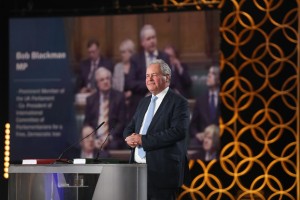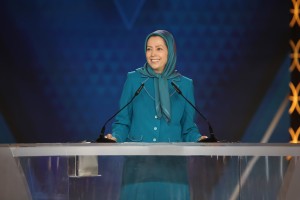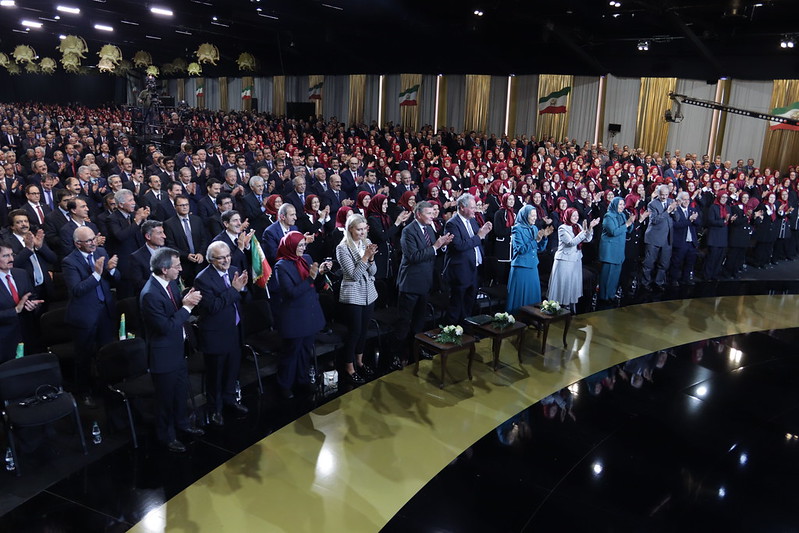British members of Parliament, David Jones, and Bob Blackman spoke on February 23 at Ashraf-3, the home of more than 3000 members of the People’s Mojahedin of Iran (PMOI) in Albania, about their admiration and support for the struggle for freedom and democracy in Iran.
Jones, the President of the cross-party British Committee for Iran Freedom, expressed his honor and delight to be among so many friends at the event. He noted that the women of Iran have played an important role in the struggle for freedom and democracy and encouraged all to support their efforts to bring about positive change in Iran.
 Jones also spoke about the central role of the PMOI and the National Council of Resistance of Iran (NCRI) in the cause of freedom and encouraged Western nations to support the people of Iran in their quest for a better future and fight against oppression. He proudly stated that the committee had been sanctioned by Tehran for their efforts to support the NCRI and fight for democracy in Iran.
Jones also spoke about the central role of the PMOI and the National Council of Resistance of Iran (NCRI) in the cause of freedom and encouraged Western nations to support the people of Iran in their quest for a better future and fight against oppression. He proudly stated that the committee had been sanctioned by Tehran for their efforts to support the NCRI and fight for democracy in Iran.
He noted that attempts to censor the NCRI and deny their support demonstrated the regime’s fear of the truth and the growing support for the NCRI.
Blackman, a UK politician, expressed his gratitude for being invited to visit Ashraf-3 and reiterated his commitment to the cause of a free, democratic, and non-nuclear republic in Iran. He also spoke about the importance of the Resistance Museum in Ashraf 3, which showcases the struggle for freedom and the martyrs who gave their lives for freedom in Iran.
 Blackman emphasized that a free and democratic Iran is possible, and it is vital that the government that replaces the clerical regime is democratically elected, with the opportunity for the people of Iran to choose their leadership and to change it if they wish to. He highlighted the brave people in Iran who put their lives on the line by standing up against the regime and deserve support from the world. The brutal regime in Tehran is not only a threat to the people of Iran but also a direct threat to the United Kingdom and the entire free world.
Blackman emphasized that a free and democratic Iran is possible, and it is vital that the government that replaces the clerical regime is democratically elected, with the opportunity for the people of Iran to choose their leadership and to change it if they wish to. He highlighted the brave people in Iran who put their lives on the line by standing up against the regime and deserve support from the world. The brutal regime in Tehran is not only a threat to the people of Iran but also a direct threat to the United Kingdom and the entire free world.
Blackman quoted Sir Winston Churchill’s famous quote, “Never was so much owed by so many to so few,” to thank the people at Ashraf-3 for their sacrifices and their continued efforts until the end of the religious dictatorship in Iran is completed. Blackman noted that the people of Iran have been struggling for freedom for more than 100 years, and there have been some successes, but they were betrayed by dictators who took over their success. He talked about the democratic revolution against Shah’s dictatorship in 1979, a popular movement by the Iranian people for freedom that was hijacked by the founder of the religious tyranny, Khomeini, who betrayed his people.
Messrs. David Jones and Bob Blackman presented a powerful statement to Maryam Rajavi, signed by 250 representatives of the British Houses of Commons and Lords from all parties. The statement expressed their unwavering support for the Iranian people’s nationwide uprising, the Iranian Resistance, and Maryam Rajavi’s 10-point plan for the future of Iran.
The MPs emphasized the critical importance of recognizing the Iranian people’s right to defend themselves and overthrow the oppressive regime. They emphasized the need to establish a democratically elected republic in Iran, where the people’s voices could be heard and respected.
Furthermore, the statement highlighted the National Council of Resistance of Iran (NCRI) as the democratic alternative to the current regime that deserves complete support. The MPs recognized the NCRI’s tireless efforts to bring democracy and human rights to Iran and expressed their solidarity with the organization and its leader, Maryam Rajavi.
 At the conference, Mrs. Maryam Rajavi, the President-elect of the National Council of Resistance of Iran (NCRI), highlighted the two opposing sides in the fate of Iran. On one side are the resistance and the struggle for freedom, democracy, and the separation of religion and state. On the other side are the enemies of freedom who wish to maintain religious tyranny in power or return to the dictatorship of the Shah.
At the conference, Mrs. Maryam Rajavi, the President-elect of the National Council of Resistance of Iran (NCRI), highlighted the two opposing sides in the fate of Iran. On one side are the resistance and the struggle for freedom, democracy, and the separation of religion and state. On the other side are the enemies of freedom who wish to maintain religious tyranny in power or return to the dictatorship of the Shah.
Rajavi praised the recent uprising in Iran as a significant turning point in Iranian developments, which forced the regime into a new era where the only way out was through overthrow. She noted that women played a vital role in leading the uprising, which showed that the Iranian people are committed to continuing their struggle. Despite its brutal attempts, the regime failed to prevent the protest movements.
Rajavi emphasized that the mullahs’ regime cannot reform its policies and can only maintain its rule through suppression. She noted that the regime has intensified its demonizing campaign against the People’s Mojahedin Organization of Iran (PMOI) and needs to play the monarchy card to negatively impact the uprising. Rajavi called on the British Parliament to lead the way in designating the Islamic Revolutionary Guard Corps (IRGC) as a terrorist group, closing down the regime’s embassies, expelling the regime’s agents, and revoking their residential documents in the West.
Rajavi concluded her speech by expressing her gratitude to the British Parliament for standing by the Iranian people and for resistance over the past four decades. She hopes that the world would recognize the legitimacy and importance of the Iranian people’s struggle to overthrow the regime and support the courageous youth in Iran.






